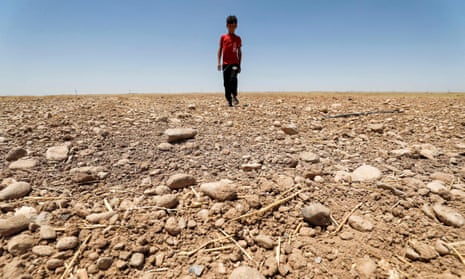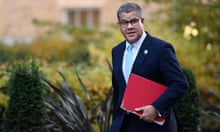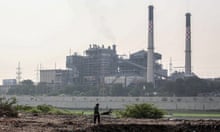The world is on track for disastrous levels of global heating far in excess of the limits in the Paris climate agreement, despite a flurry of carbon-cutting pledges from governments at the UN Cop26 summit.
Temperature rises will top 2.4C by the end of this century, based on the short-term goals countries have set out, according to research published in Glasgow on Tuesday.
That would far exceed the 2C upper limit the Paris accord said the world needed to stay “well below”, and the much safer 1.5C limit aimed for at the Cop26 talks.
At that level, widespread extreme weather – sea-level rises, drought, floods, heatwaves and fiercer storms – would cause devastation across the globe.
The estimate stands in sharp contrast to optimistic forecasts published last week that suggested heating could be held to 1.9C or 1.8C, thanks to commitments announced at the talks, now in their second week and scheduled to end this weekend.
Those estimates were based on long-term goals set out by countries including India, the world’s third-biggest emitter, which is aiming for net zero emissions by 2070.
By contrast, the sobering assessment of a rise of 2.4C from Climate Action Tracker (CAT), the world’s most respected climate analysis coalition, was based on countries’ short-term goals for the next decade.
Bill Hare, the chief executive of Climate Analytics, one of the organisations behind CAT, told the Guardian: “We are concerned that some countries are trying to portray [Cop26] as if the 1.5C limit is nearly in the bag. But it’s not, it’s very far from it, and they are downplaying the need to get short-term targets for 2030 in line with 1.5C.”
Emissions will be twice as high in 2030 as they need to be to stay within 1.5C, based on promises made in Glasgow, CAT found. Scientists have warned that beyond 1.5C, some of the damage to the Earth’s climate will become irreversible.
The analysts also found a chasm between what countries have said they will do on greenhouse gas emissions and their plans in reality. If current policies and measures are taken into account, rather than just goals, heating would rise to 2.7C, based on the CAT analysis.
The findings should serve as a “reality check” to the talks, said Niklas Höhne, one of the authors. “Countries’ long-term intentions are good, but their short-term implementation is inadequate,” he told the Guardian.
The 197 parties to the 2015 Paris agreement were asked to come to Glasgow with two aims: a long-term goal of reaching global net zero emissions around mid-century; and shorter-term national plans, known as nationally determined contributions (NDCs), pegging emissions reductions to 2030. Scientists say greenhouse gas emissions must fall by about 45% this decade for global temperatures to stay within 1.5C of pre-industrial levels.
Countries responsible for about 90% of global emissions have signed up to net zero goals, mostly by around 2050 for developed countries, rising to 2060 for China and 2070 for India, but the NDCs for actions in the next decade do not match up. The climate responds to the cumulative carbon in the atmosphere, so if emissions are high enough in the next two decades the world could surpass the 1.5C limit even if carbon reaches net zero later.
“It’s great that countries have long-term net zero targets, but they need to close the gap with short-term measures,” said Hare.
The first week of the Cop26 talks was dominated by a rush of announcements, including commitments on preserving forests, private sector finance for clean energy, and countries phasing out coal. Some of these quickly started to unravel as countries appeared to renege or clarify some of their commitments.
At the start of the second week of the fortnight-long talks, sharp rifts are appearing between countries that want tougher action, specifically to force countries to revise their NDCs annually if they are not in line with 1.5C, and others wanting to stick to the Paris timetable of five-yearly revisions. There are also disputes about how countries should monitor emissions, and over climate finance for poor countries.
Hare noted there was no contradiction among the varying assessments, published last week by Melbourne University and the International Energy Agency, as they came to similar conclusions based on long-term goals. CAT also found in its “optimistic scenario” that if all targets countries had promised were fully met, temperatures would rise by 1.8C.
The UN environment programme updated its analysis of the “emissions gap” between the cuts needed to stay within 1.5C and those offered by governments. Unep found that with the recently announced pledges by China, Saudi Arabia and others, temperatures were likely to rise by between 1.9C and 2.1C, but like the IEA and Melbourne estimates, that depended on long-term pledges being fully implemented.
Hare said many of the long-term goals countries had set out lacked credibility. He pointed to Brazil, Australia and Russia. “We are concerned that there is not a seriousness of purpose at Cop26. It’s very hypothetical, getting to net zero in 2050,” he said.
Höhne said countries must agree to revise their NDCs every year if they were found insufficient, adding: “If we came back every five years that would be a very bad choice. If countries agree to come back every year, they would have a chance of closing the gap.”
Jennifer Morgan, the executive director of Greenpeace International, said: “This new calculation is like a telescope trained on an asteroid heading for Earth. It’s a devastating report. We have until the weekend to turn this thing around. That means countries agreeing how they’re going come back next year and every year after that until the gap to 1.5C is closed. The ministers shouldn’t leave this city until they’ve nailed that.”
A Cop26 spokesperson said: “We know that the window to keep 1.5C alive is closing but the Intergovernmental Panel on Climate Change is clear that it is still achievable. As today’s reports make clear, we’ve seen genuine progress in the first week of Cop26, but we have a lot more to do.”
Labour’s Ed Miliband, the shadow business secretary, said: “The test of Cop26 has always been what concrete commitments it would deliver by 2030, the decisive decade to keep 1.5C alive. This report is an important reality check on the government’s attempt to greenwash Glasgow.”
Green party co-leader Adrian Ramsay said: “Today was the day the sugar coating fell off the Cop26 talks to reveal the bitter pill that world leaders are going to force us to swallow if they don’t take much stronger action. This report shows that action in the next 10 years is vital. Long term targets, promises and non-existent technofixes, with no actual policies to get us there, are worth nothing. It shows that most global leaders have been asleep at the wheel. This is their wake-up call.”









